Exhibitions Diasporas are the Landscape
September 25 - December 13, 2025
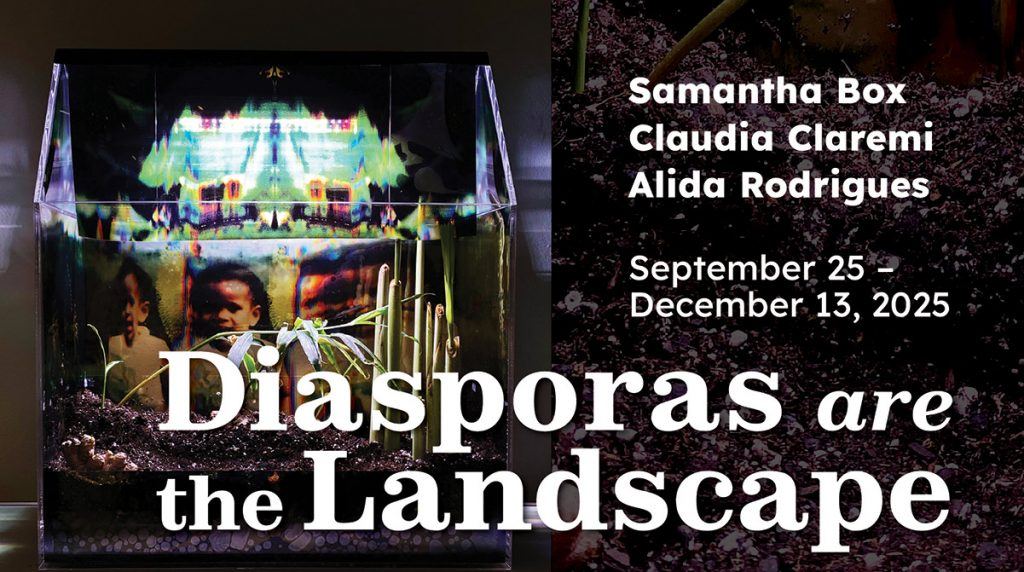 Portable Homeland #6, Acrylic box, growlight, soil, plants and seeds, image (Fracture) printed on acetate 22x22x8 in, Samantha Box, 2022
Portable Homeland #6, Acrylic box, growlight, soil, plants and seeds, image (Fracture) printed on acetate 22x22x8 in, Samantha Box, 2022Opening Reception + Panel Discussion: September 25, 6-9pm
Closing Events + Party: December 13, 4:30-9pm
Gallery Hours:
Wednesday – Friday: 11-6pm
Saturday: 12-4pm
Diasporas are the Landscape features contemporary photography and film artists whose work explores experiences of diaspora from diverse geographical, cultural and linguistic perspectives. Each artist has been developing practices that intimately engage with the struggle to maintain traditions and identities across borders, the performance and archiving of collective memories, and the process of recovery and illumination of lost histories.
Further uniting their varying perspectives, each artist uses imagined, real, or artificial tropical flora and fauna as metaphors to explore their unique diasporic experiences. The gallery will feature a new film and video installation from the series Roots of Support by Claudia Claremi (b. 1986, Spain), an installation of dioramas from the series Portable Homeland by Samantha Box (b. 1977, USA), and an installation of photo-embroidery work by Alida Rodrigues (b. 1983, UK).
Diasporas are the Landscape is curated by VSW Assistant Curator and Artist, Hernease Davis. Read the full press release here.
Related Programs
• Saturday Oct. 11: Claudia Claremi + José López Serra: La memoria en la diáspora (Virtual)
• Saturday Nov. 15: Diasporas are the Landscape Curator Walkthrough, 2:30-4pm
• Thursday Dec. 4: Qiana Mestrich + Carla J. Williams: Decolonizing Photography History
• Saturday Dec. 13: Diasporas are the Landscape Closing Events with Samantha Box + Party
VSW program funders include The New York State Council on the Arts with support from the New York State Legislature, The Joy of Giving Something Foundation, Monroe County, NY, and the William & Sheila Konar Foundation.
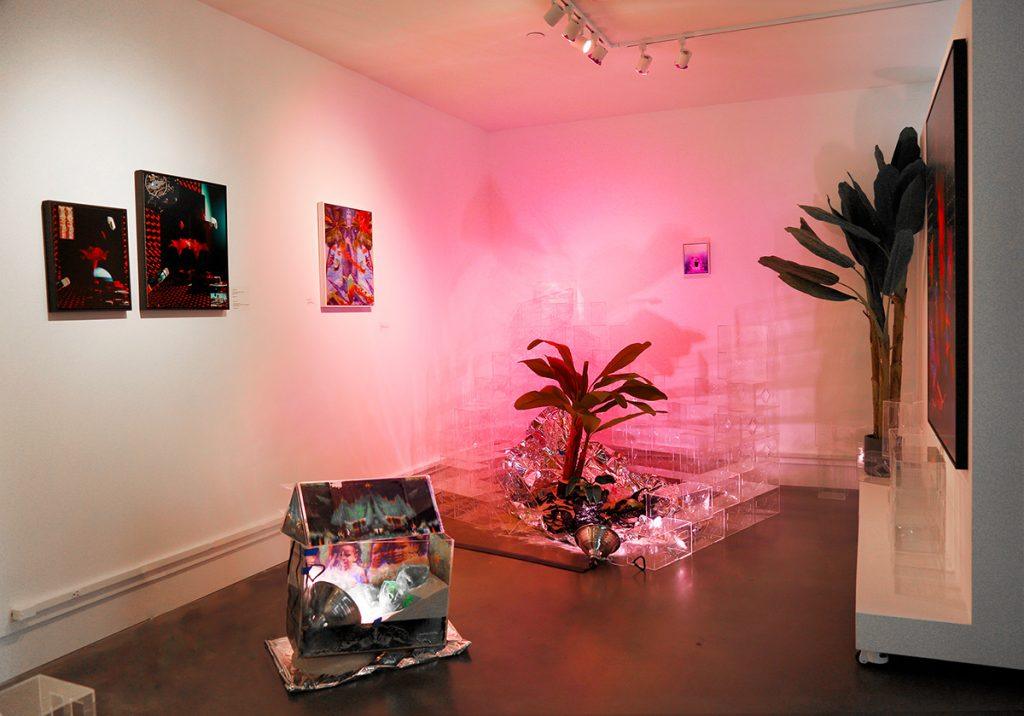 Samantha Box, site specific installation that includes photographs from the series Constructions, banana trees, scandal bags, terrarium dioramas from the series Portable Homelands
Samantha Box, site specific installation that includes photographs from the series Constructions, banana trees, scandal bags, terrarium dioramas from the series Portable Homelands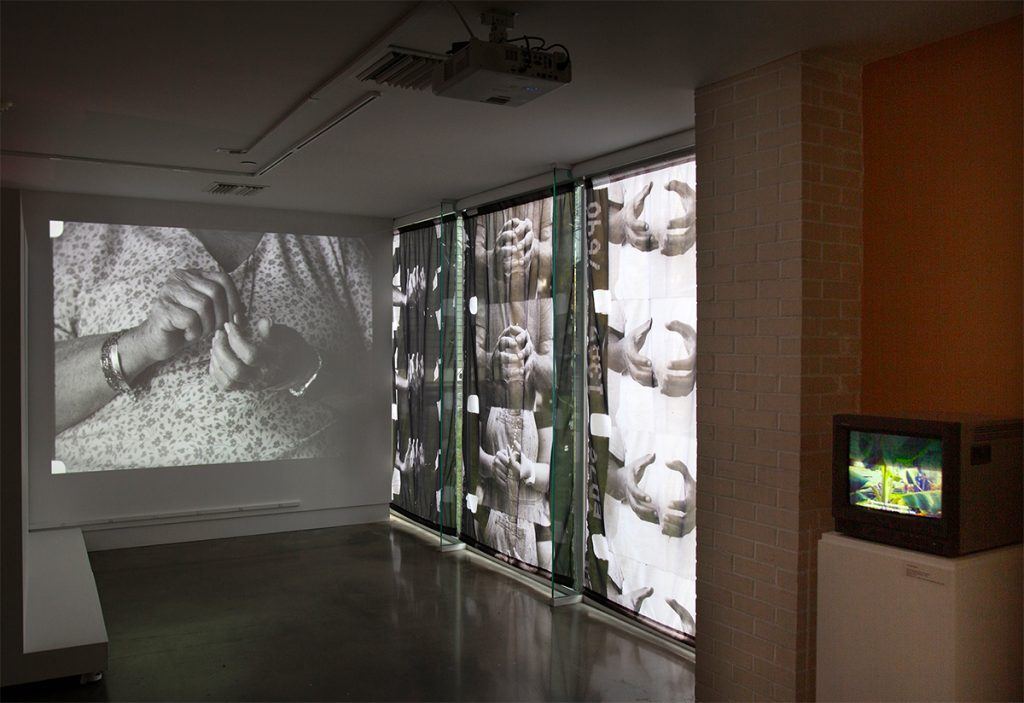 Claudia Claremi, From the series, Roots of Support/Raíces de Apoyo, Left: Banana Plant (Rochester, NY), Middle: La Pedrá (Puerto Rico), Right: El Hangar (Puerto Rico)Super-8 and 16mm transferred to fullHD
Claudia Claremi, From the series, Roots of Support/Raíces de Apoyo, Left: Banana Plant (Rochester, NY), Middle: La Pedrá (Puerto Rico), Right: El Hangar (Puerto Rico)Super-8 and 16mm transferred to fullHD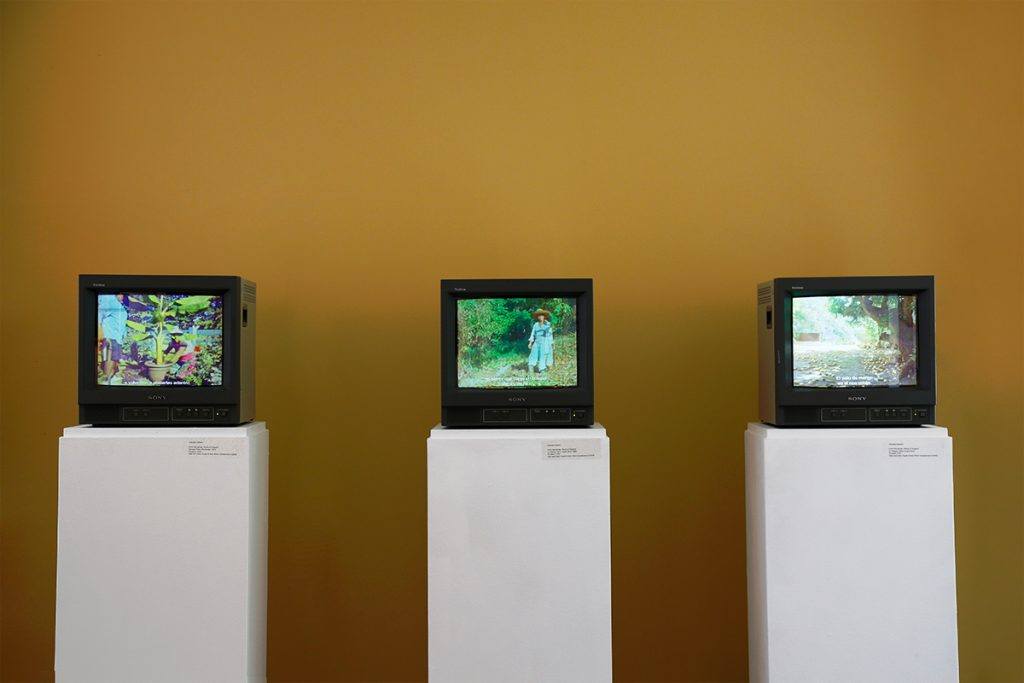 Claudia Claremi, La memoria de las frutas (diásporas), 16mm film transferred to 4K digital video
Claudia Claremi, La memoria de las frutas (diásporas), 16mm film transferred to 4K digital video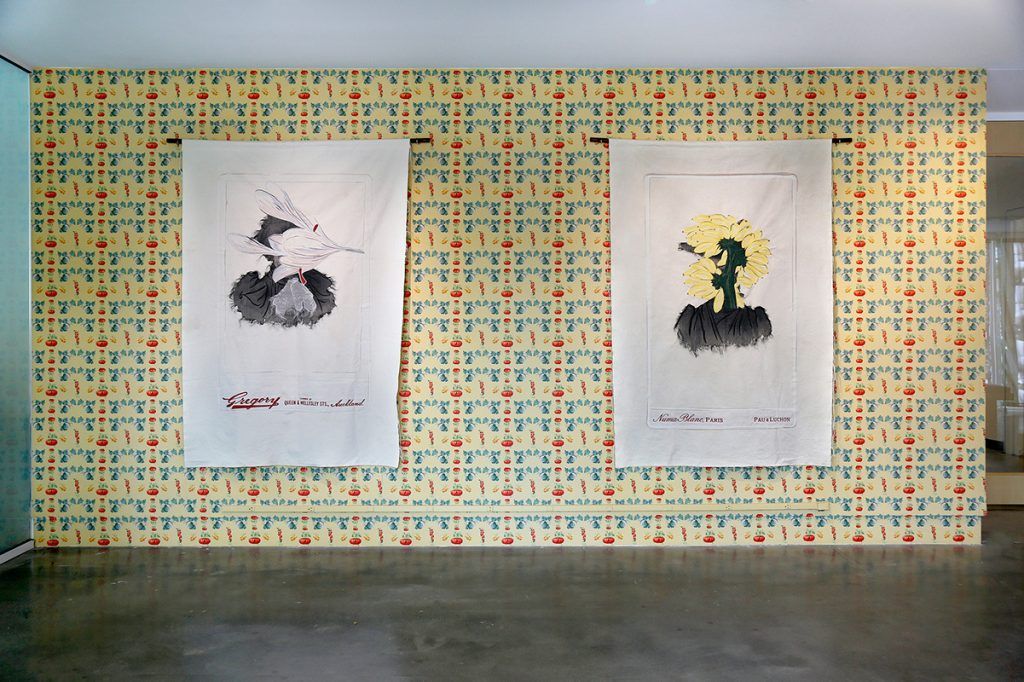 Alida Rodrigues, Crocus sativus L. ( Za’faran in Arabic and Zarparan in Persian) (Left) Plantain (Musa x acuminata), Kluai in Thailand, Pisang in Malaysia and Indonesia, Saging in the Philippines, Chia in China and Vietnam. (Right), Seeds of Memory, Custom wallpaper
Alida Rodrigues, Crocus sativus L. ( Za’faran in Arabic and Zarparan in Persian) (Left) Plantain (Musa x acuminata), Kluai in Thailand, Pisang in Malaysia and Indonesia, Saging in the Philippines, Chia in China and Vietnam. (Right), Seeds of Memory, Custom wallpaper
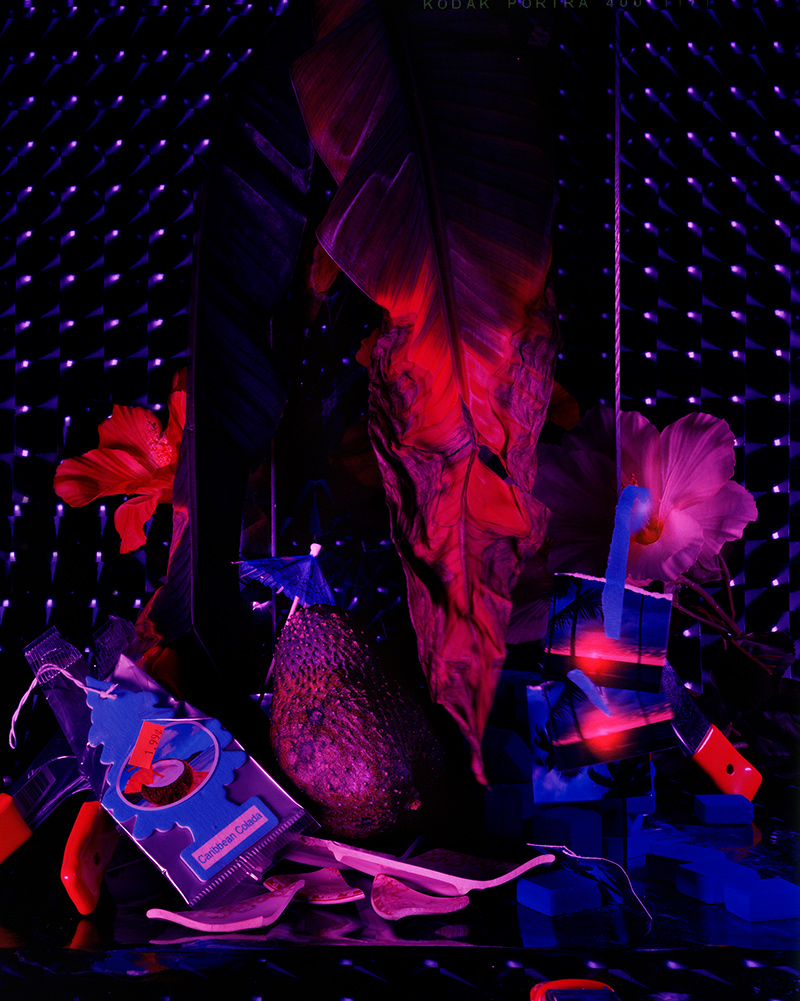 A New Landscape, Samantha Box, 2024
A New Landscape, Samantha Box, 2024Samantha Box is a Jamaican-born, Bronx-based artist who uses photography, sound and installation to chart the fluctuating and tenuous physical and psychosocial spaces of queerness and diaspora. She holds an MFA in Advanced Photographic Studies from the International Center of Photography-Bard College. Her work has been recently showcased in solo exhibitions at Light Work, the Des Moines Art Center, and the National Museum of Women in the Arts (DC), and in group exhibitions at Le Rencontres d’Arles, the Bronx Museum of Arts, and Baxter Street CCNY.
Box has been an artist-in-residence at the Center of Photography at Woodstock, the Visual Studies Workshop and at Light Work. She has been awarded a NYFA/NYSCA Fellowship in Photography twice: in 2010 and in 2022, an En Foco Fellowship, and a Silver Eye Fellowship. In 2023, she was shortlisted for the Aperture Portfolio Prize, the Louis Roederer Discovery Award, and the Prix De La Photo Madame Figaro; in 2024, she was nominated for the Foam Paul Huf Award; and in 2025, she was shortlisted for the CPW Saltzman Prize. Her work is in the collections of the Museum of Fine Art Houston, and of the Harvard Art Museums.
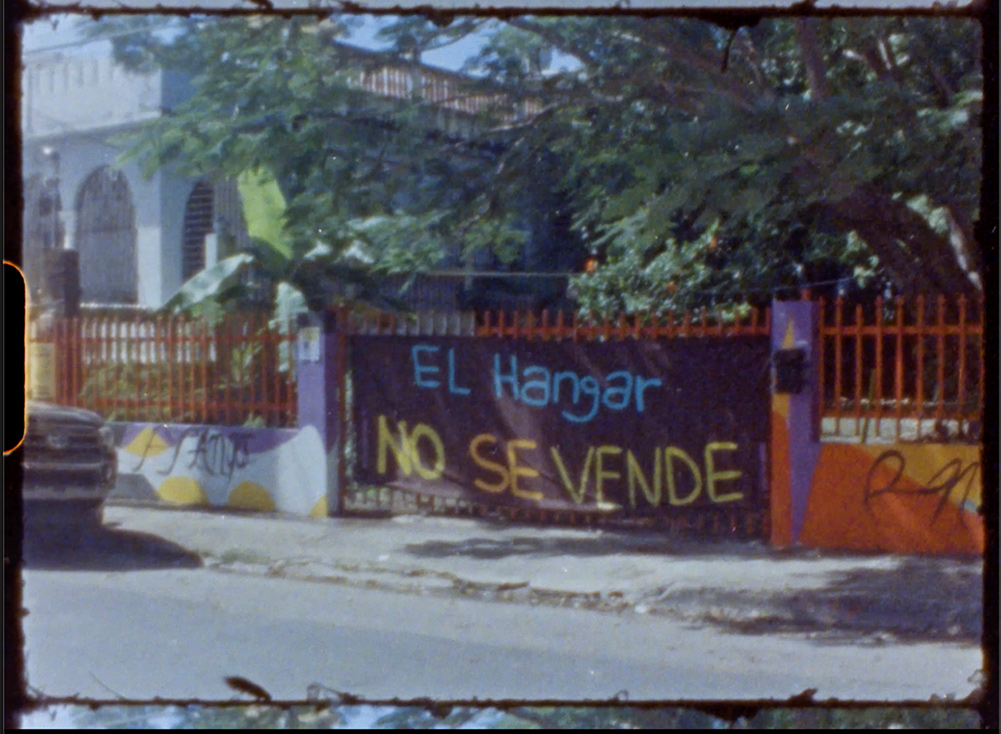 Film still from Roots of Support, Claudia Claremi, 2025
Film still from Roots of Support, Claudia Claremi, 2025Claudia Claremi (Madrid, 1986) is an artist and filmmaker. Her work explores collective experiences, shared imaginaries and the depths of memory and the unconscious to unveil structures of Western modernity that are hidden from view. Her films create sensory experiences for the viewer and her approach to moving images is multidisciplinary, including video, analogue film, installation, photography, archive, or text. Most of her projects delve into embodiment, memory, diaspora, and coloniality.
Claremi graduated in Documentary Film from the International Film School of San Antonio de los Baños (Cuba) and in Fine Arts from University of the Arts London (UK) and the Instituto Superior de Arte de La Habana (Cuba). She has been an artist-in-residence at Beta Local in San Juan, Puerto Rico (2015), Centro de Residencias Matadero Madrid (2021), the Visual Studies Workshop in Rochester, NY (2023) and The Clemente in NYC (2023). Among the grants and awards she has received are the Generaciones Award from the Montemadrid Foundation (2021), Circuitos de Artes Plásticas (2021), and the NOEXPO programme in the Museo Reina Sofía in Madrid (Spain). Her films have been screened and awarded at festivals such as Raindance, Ann Arbor, Ji.hlava, FIC Guadalajara, Vienna Shorts, Makedox, LOOP Barcelona, Oberhausen, the Rencontres Internationales Paris/Berlin, Márgenes, Documentamadrid, etc. and shown at CA2M, Centre for Contemporary Arts Glasgow, Museo de Arte Moderno de Medellín, HKW in Berlin and the Cervantes Institutes in Tokyo and New York. Her work has also been exhibited at La Casa Encendida, Sandretto Re Rebaudengo (Madrid), the Center for Visual Art (Denver), Paul Robeson Galleries (Newark), Cuchifritos Gallery (NY), Manifattura Tabacchi (Florence), and El Lobi (San Juan), among others.
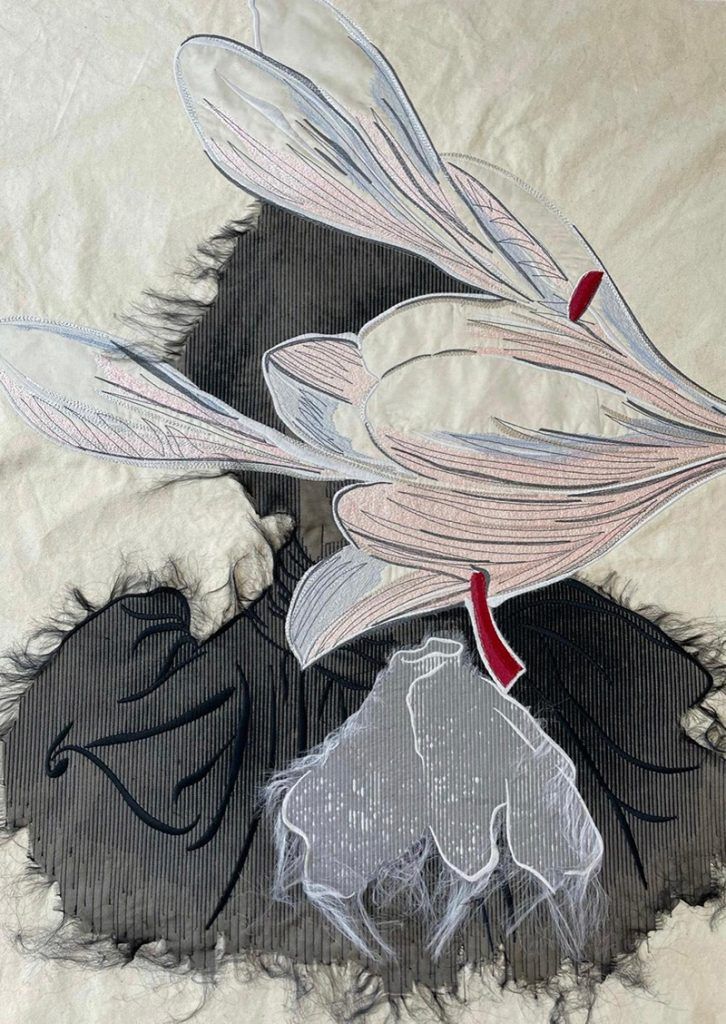 Crocus sativas L., photo embroidery, Alida Rodrigues, 2021
Crocus sativas L., photo embroidery, Alida Rodrigues, 2021Alida Rodrigues is an Angolan visual artist with a notable presence in exhibitions across Africa, Europe, and the UK. She has also participated in artist residencies in Mexico, the UK, and the USA. In 2019, Rodrigues featured in the film Relic 3, part of Relic Traveller: Phase 2 by British-Ghanaian artist Larry Achiampong. Her collaboration with the fashion label Winnie New York won the Karl Lagerfeld Prize in 2022.
Rodrigues’s artistic practice weaves together collage, textile, and installation, using 19th century black and white photographs and botanical illustration. At its core, her work delves into layered concepts of identity, investigating themes of belonging and un-belonging. She is deeply motivated by the need to confront the enduring legacies of colonialism, unravelling how this complex past continues to shape global dynamics of race, culture, politics, land, economics, and society.
Central to her practice is the exploration of the racial dimensions of historical imagery, questioning whose stories are preserved and celebrated and whose narratives remain obscured. This inquiry extends into the realm of ethnobotany, where she investigates the intertwined histories of plants and people. She examines the roles women have played in plant exploration and the extraction of botanical knowledge from indigenous women to serve colonial interests. Through archival research, Rodrigues explore the act of collecting and cataloguing drawing connections between the classification of plants and the racial categorisation of humans.